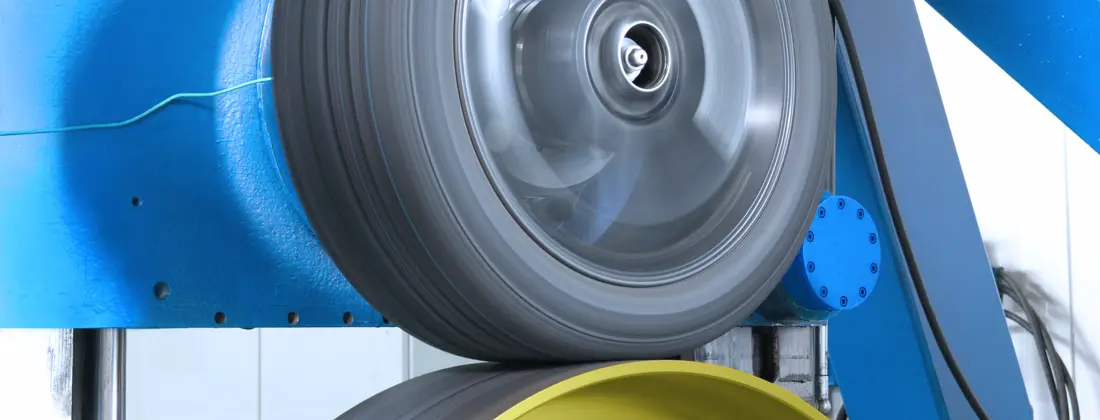FMVSS 129 New Tyre Load and Speed Rating Test
The Federal Motor Vehicle Safety Standard (FMVSS) 129 specifies the performance requirements and testing procedures for new tyres to ensure they meet safety standards. This test, in particular, evaluates the load-carrying capacity and speed rating of tyres under various conditions to ensure their suitability for safe vehicle operation.
The FMVSS 129 New Tyre Load and Speed Rating Test is critical for automotive manufacturers as it directly impacts consumer safety and regulatory compliance. The test involves subjecting tyres to a series of load tests at different speeds, ensuring the tyre can handle the maximum static load without failure under specified operating conditions.
The testing process begins with careful selection and preparation of the tyres according to the FMVSS 129 guidelines. Each tyre is loaded with increasing weights until it reaches its rated capacity, while speed tests are conducted at various speeds up to the maximum permissible rating. This ensures that the tyre's ability to maintain traction, stability, and integrity under load and at high speeds is thoroughly assessed.
The test apparatus typically includes a hydraulic loading system capable of applying precise loads and measuring forces accurately. Speed tests are conducted on a controlled environment where tyre performance can be monitored under standardized conditions. The instrumentation used includes load cells, strain gauges, and data acquisition systems to capture real-time performance metrics.
Upon completion of the test, the results are compared against the FMVSS 129 standards to ensure that each tyre meets the required load-carrying capacity and speed rating without compromising safety. This testing ensures that tyres meet the stringent requirements set forth by federal regulations, thereby enhancing overall vehicle safety.
The importance of this test cannot be overstated in the automotive industry. It is a critical step towards ensuring that tyres are reliable and safe for use on public roads. By adhering to these standards, manufacturers can avoid costly recalls and potential legal issues associated with non-compliant products.
Customer Impact and Satisfaction
The FMVSS 129 test directly impacts customer satisfaction by ensuring that tyres are safe, reliable, and perform as expected under various conditions.
Automotive manufacturers benefit from improved brand reputation and reduced risks associated with non-compliant products.
R&D engineers can use test results to refine tyre design and materials for better performance and safety.
Compliance officers ensure that all tyres meet the required standards, thereby avoiding costly recalls and legal issues.
The FMVSS 129 New Tyre Load and Speed Rating Test is a cornerstone of automotive safety. It ensures that tyres are reliable and safe for use on public roads, contributing to overall road safety and consumer satisfaction. By adhering to these standards, manufacturers can avoid costly recalls and potential legal issues associated with non-compliant products.
International Acceptance and Recognition
The FMVSS 129 test is widely recognized and accepted in the automotive industry for its rigorous evaluation of tyre load-carrying capacity and speed rating. Compliance with these standards ensures that tyres meet the highest safety and performance requirements.
Manufacturers who adhere to FMVSS 129 are more likely to gain international acceptance, as this test aligns with global safety standards set by ISO and EN. This recognition enhances brand reputation and marketability on a worldwide scale.
The FMVSS 129 New Tyre Load and Speed Rating Test is essential for ensuring that tyres meet the stringent requirements set forth by federal regulations, thereby enhancing overall vehicle safety. By adhering to these standards, manufacturers can avoid costly recalls and potential legal issues associated with non-compliant products.
Competitive Advantage and Market Impact
The FMVSS 129 test provides a significant competitive advantage for automotive manufacturers by ensuring that their tyres meet the highest safety standards. This can lead to increased market share as consumers trust brands that prioritize safety and reliability.
Manufacturers who comply with FMVSS 129 are more likely to gain international acceptance, enhancing brand reputation and marketability on a worldwide scale. By adhering to these standards, manufacturers can avoid costly recalls and potential legal issues associated with non-compliant products.
The FMVSS 129 New Tyre Load and Speed Rating Test is essential for ensuring that tyres meet the stringent requirements set forth by federal regulations, thereby enhancing overall vehicle safety. By adhering to these standards, manufacturers can avoid costly recalls and potential legal issues associated with non-compliant products.





